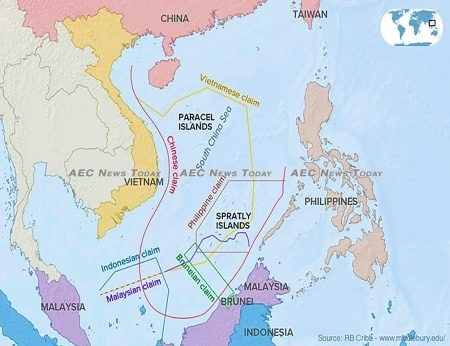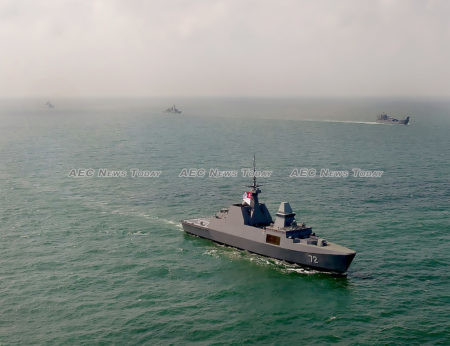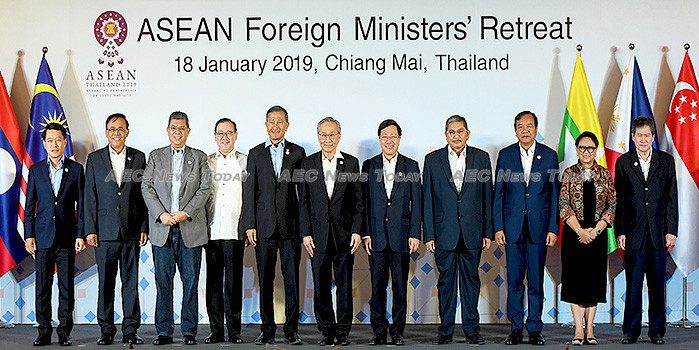Government officials and heads-of-state in Asean appears to have a collective aversion to speaking up in public about Chinese transgressions and coercion in the South China Sea (SCS). Such reticence is based on misplaced fears of Chinese repercussions and does a disservice to regional interests, undermines deterrence, and needlessly concedes leverage in negotiations with China on territorial disputes or a SCS Code of Conduct.

This sentiment was displayed in a recent interview with Singapore’s Defence Minister, Ng Eng Hen, who downplayed concerns over Chinese activities in the disputed waters.
Mr Ng said calling China a regional hegemon was a matter of ‘opinion’, gave credence to China’s ‘peaceful rise’ narrative and highlighted China’s positive role in economics and trade. All were unprompted comments made in the context of discussing the SCS disputes.
Other Asean leaders, such as Philippines President Rodrigo Duterte, have also made accommodating statements that seem to downplay China’s actions in the SCS.
At a regional level Asean chairman statements are noteworthy for their relatively benign rhetoric and failure to include terms such as ‘erosion of trust’ or ‘militarisation’ of the SCS due to Chinese actions. In some cases, China has successfully lobbied the bloc to remove such language.
Words an important tool

Directly opposing Chinese coercion in the SCS is antithetical to some Asean leaders who may fear that new or enhanced postures could antagonise China, the region’s largest trading partner. But, directly calling out China’s breaks from the status quo or intimidation tactics may not necessarily put these countries at risk of Chinese countermeasures.
Words, and their cognitive effect in the region and in Beijing, could be used to greater effect as an important tool to push back against Chinese coercion.
To be clear, words alone will not solve the territorial disputes with China. But they could signal the principles that countries stand for and the concerns that they hold. They could set the tone for negotiations, enhance morale and communicate resolve.
Words also matter a great deal to China. One needn’t look further than the sensitivity with which China regards Asean chairman statements on the SCS as an example.
China alone undermining SCS stability
There is only one country undermining stability in the SCS: China. It has reclaimed over 1,200 hectares (about 3000 acres) of land — far more than any other claimant — on its occupied features in the Paracel and Spratly islands. It has built military facilities on its claimed islands that support the forward deployment of air, naval, and land-based assets, and deployed missiles on them.
China increasingly uses both government and non-government assets to deny other nations’ legitimate use of resources in their exclusive economic zones in the SCS. It called an international legal ruling on its maritime claims illegitimate and a piece of ‘waste paper’. And it engages in unsafe and unprofessional behaviour when coming into contact with aircraft and naval vessels of the United States and other nations.
Most of these activities constitute clear breaks of international law and violations of the consensus in the 2002 Declaration on the Conduct of Parties in the SCS between Asean and China.

China’s actions in the SCS are not disputed by officials and academics in the region. Highlighting these facts should not be controversial. Yet leaders in almost every Asean member country seem to be meeting China’s strategy of changing the status quo through coercion with quiet accommodation.
While this may be because leaders fear potential consequences from China, such fears are overblown.
What is needed is a cognitive shift in how officials in Asean approach the public signalling of the China problem in the SCS
Asean leaders should consider dropping the notion that speaking up publicly about Chinese activities that threaten and undermine basic norms of peace and stability will harm their relations in the region or with China.
Similarly, countries in the region should cease viewing the SCS disputes as a binary choice between war with China and accommodating Chinese activities, as Ng and others have suggested.
Calling out Chinese transgressions is unlikely to lead to war. To the contrary, more words might incrementally bolster morale and possibly prompt other leaders to feel less insecure about speaking up themselves.
This article was written by Lyle J Morris, a senior policy analyst at the nonprofit, nonpartisan RAND Corporation. It first appeared on East Asia Forum under a Creative Commons License and is reproduced here with its permission.
Feature photo
Related:
- China’s Next Phase of Militarization in the South China Sea (The Diplomat)
- Resolution of SCS conflict to take more time as China refuses to recognize arbitral ruling (The Manila Bulletin)
- The Real Problem with China’s South China Sea Bases (The National Interest)
- Would a nuclear war erupt over South China Sea dispute? (Gulf News)
East Asia Forum
It consists of an online publication and a quarterly magazine, East Asia Forum Quarterly, which aim to provide clear and original analysis from the leading minds in the region and beyond.
Latest posts by East Asia Forum (see all)
- China’s South China Sea bullying seeing increased blowback from Asean claimants – February 2, 2022
- Illusionary, delusionary or visionary? Cambodia tests living with COVID-19 – December 6, 2021
- Prioritising a Philippine–EU FTA is vital for post-pandemic recovery – July 26, 2020
- Time for Asean to stand up for itself in the South China Sea – July 25, 2020



Yes “words could signal the principles that countries stand for and the concerns that they hold; they could set the tone for negotiations, enhance morale and communicate resolve.” Therefore Asean countries should use the word liar to call out China if she cannot prove SCS was handed down to it by its ancient ancestors. The proof should include words written by China’s ancient ancestors saying that : 1. the SCS was meant by them, not any other sea; 2, the size of the sea to be equal to the size defined by China’s 9 dashes, not one Li (mile) or two Lis; 3, treaties signed between the ancient Chinese government and those governments bordering on the sea agreeing to China’s ownership to the sea.
If China cannot provide such a proof, written down by its ancient ancestors, then China is a liar.